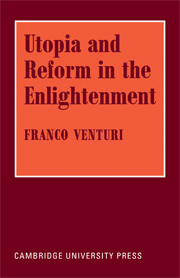I - Kings and republics in the seventeenth and eighteenth centuries
Published online by Cambridge University Press: 07 October 2011
Summary
When we speak of the republican tradition and of the importance of its role in forming the political ideas of the eighteenth century our mind at once turns to the ancient world, and to the great examples of Athens and Rome. Of course, the importance of the classical tradition is beyond any doubt. What I should like to do now is not so much to measure its intensity and importance in the eighteenth century or to see how it was used in the age of the Enlightenment. I shall not enquire into how much republican thought derives from Pericles or Titus Livius, but rather how much derives from the experience undergone by the Italian, Flemish and German cities, by Holland, Switzerland, England and Poland. The republican tradition which the eighteenth century inherited and made fruitful sometimes had a classical colouring. More often it was born from a direct experience, and one not so distant in time. It was a root which came to life again after the age of absolutism and the restorations of the sixteenth and seventeenth centuries.
It is by no means accidental that the ancient and classical form of republican thought was particularly evident in France in the last decades of the century, until the time when it began simmering dangerously during the revolution. The philosophes, the Girondins and the Jacobins, looked to Camillus and Brutus for the very reason that the French had no experience which could serve as a model of republican inspiration.
- Type
- Chapter
- Information
- Utopia and Reform in the Enlightenment , pp. 18 - 46Publisher: Cambridge University PressPrint publication year: 1971
- 3
- Cited by



